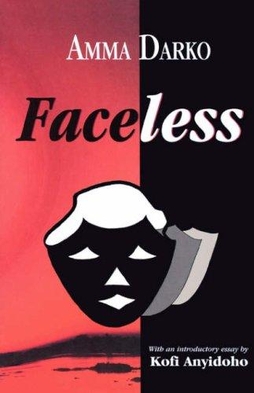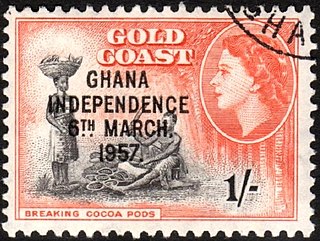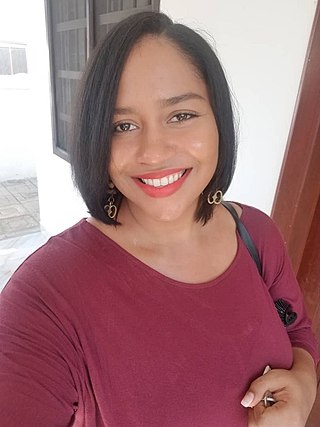There are many styles of traditional and modern music of Ghana, due to Ghana's worldwide geographic position on the African continent.

Ama Ata Aidoo was a Ghanaian author, poet, playwright, politician, and academic. She was Secretary for Education in Ghana from 1982 to 1983 under Jerry Rawlings's PNDC administration. Her first play, The Dilemma of a Ghost, was published in 1965, making Aidoo the first published female African dramatist. As a novelist, she won the Commonwealth Writers' Prize in 1992 with the novel Changes. In 2000, she established the Mbaasem Foundation in Accra to promote and support the work of African women writers.

Ghana is a country of 28.21 million people and many native groups, such as:
Akan is a group of several closely related languages within the wider Central Tano languages. These languages are the principal native languages of the Akan people of Ghana, spoken over much of the southern half of Ghana. About 80% of Ghana's population can speak an Akan language as a first or second language, and about 44% of Ghanaians are native speakers. There are populations of polyglots in Ghana who speak an Akan language as a third language. They are also spoken in parts of Côte d'Ivoire.
Enid Margaret "Peggy" Appiah, MBE, was a British children's author, philanthropist and socialite. She was the daughter of the Right Honourable Sir Stafford Cripps and Dame Isobel Cripps, and the wife of Ghanaian lawyer and political activist Nana Joe Appiah.

Efua Theodora Sutherland was a Ghanaian playwright, director, dramatist, children's author, poet, educationalist, researcher, child advocate, and cultural activist. Her works include the plays Foriwa (1962), Edufa (1967), and The Marriage of Anansewa (1975). She founded the Ghana Drama Studio, the Ghana Society of Writers, the Ghana Experimental Theatre, and a community project called the Kodzidan. As Ghana's earliest playwright-director, she was an influential figure in the development of modern Ghanaian theatre, and helped to introduce the study of African performance traditions at university level. She was also a pioneering African publisher, establishing the company Afram Publications in Accra in the 1970s.

Asase Ya/Afua is the Akan goddess of fertility, love, procreation, peace, truth and the dry and lush earth in Ghana and Ivory Coast. She is also Mother of the Dead known as Mother Earth or Aberewaa.

Faceless is a 2003 novel by Ghanain writer Amma Darko. The novel highlights the abuse of the girl-child and women in Africa. The novel received critical reviews and has been read by people with inquisitive dispositions and others.

Taiye Selasi is an American writer and photographer. Of Nigerian and Ghanaian origin, she describes herself as a "local" of Accra, Berlin, New York and Rome. In 2005, Selasi published "Bye-Bye, Babar ", her seminal text on Afropolitans. Her novel, Ghana Must Go, was published by Penguin in 2013.

Ghana gained independence from the British on 6 March 1957. It is a member of the Commonwealth of Nations. The country became a republic on July 1, 1960.
Grace Omaboe, popularly known as Maame Dokono, is a Ghanaian actress, singer, television personality, author and a former politician. She run the former Peace and Love Orphanage which is now Graceful Grace school in Accra. She was honored by the organizers of 3Music Awards for her achievement in the entertainment industry in Ghana.

Zanetor Agyeman-Rawlings is Ghanaian medical doctor, politician, Activist & Campaigner who is the eldest daughter of the 1st President under the 4th Republic of Ghana Jerry Rawlings (1993–2001) and former first lady Nana Konadu Agyeman (1993–2001). She is a member of the Ghanaian parliament for the Klottey-Korle Constituency and a medical doctor and humanitarian. She is also a member of the National Democratic Congress (NDC) on which she won her seat to be a member of parliament for her constituency.
The Mbaasem Foundation is a foundation established by Ghanaian writer Ama Ata Aidoo in Accra, Ghana, in 2000. It is a nonprofit foundation dedicated to supporting and promoting the work of African women writers, to "establish and maintain a writing place for women". In 2002 the rented headquarters of the foundation was "likened to the transformation of Ernest Hemingway's home in Chicago into a literary haven and museum". The Foundation states its mission as being "To support the development and sustainability of African women writers and their artistic output", and as its goal: "To create an enabling environment for women to write, tell and publish their stories."

Ghana Must Go is the debut novel of Taiye Selasi. It was published in 2013, and nominated for an NAACP Image Award. The novel follows the Sai family as they come to terms with their father Kweku Sai's death, and as they work through family troubles. Multiple points of view give insight into the characters' emotions and the repercussions of Kweku’s choices. The Wall Street Journal praised it as "irresistible from the first line".
Nana Ekua Brew-Hammond is an American-Ghanaian writer of novels, short stories and a poet. She has written for AOL, Parenting Magazine, the Village Voice, Metro and Trace Magazine. Her short story "Bush Girl" was published in the May 2008 issues of African Writing and her poem "The Whinings of a Seven Sister Cum Laude Graduate Working Board as an Assistant" was published in 2006's Growing up Girl Anthology. A cum laude graduate of Vassar College, she attended secondary school in Ghana. Her book Powder Necklace is loosely based on the experience. In 2014 she was chosen as one of 39 of Sub-Saharan Africa's most promising writers under the age of 40, showcased in the Africa39 project and included in the anthology Africa39: New Writing from Africa South of the Sahara. She is also a contributor to the 2019 anthology New Daughters of Africa, edited by Margaret Busby.

Theophilus Herman Kofi Opoku was a native Akan linguist, translator, philologist, educator and missionary who became the first indigenous African to be ordained a pastor on Gold Coast soil by the Basel Mission in 1872. Opoku worked closely with the German missionary and philologist Johann Gottlieb Christaller as well as fellow native Akan linguists, David Asante, Jonathan Palmer Bekoe, and Paul Staudt Keteku in the translation of the Bible into the Twi language.
Mary Esther Kropp Dakubu was an American linguist based in Ghana, known for her work on Ghanaian languages. She was professor emerita at the Institute of African Studies at the University of Ghana, where she had been affiliated since 1964.
Michael Francis Dei-Anang was a Ghanaian civil servant, writer, poet, and novelist.

Marleen Anmortsoo Hutchful was a Ghanaian actress. She was cast in the Ghanaian TV series Things We Do for Love.

Beyond the Horizon is a debut novel by Ghanaian author Amma Darko. The English version was first released on 1 March 1995.












